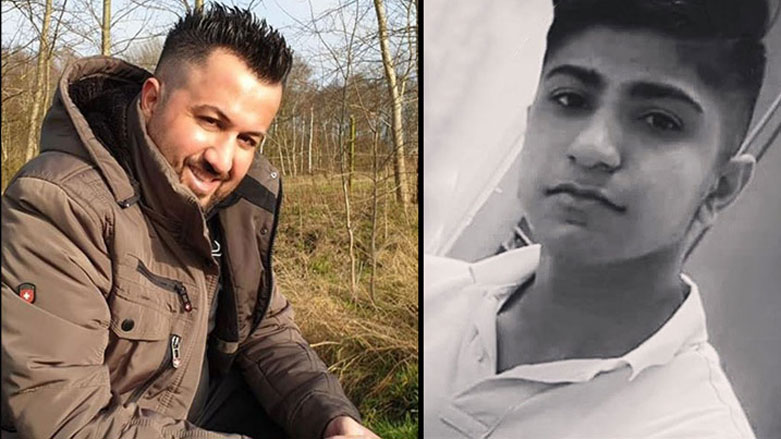Germany’s Yezidi community shocked by second murder in 3 days

ERBIL (Kurdistan 24) – Only three days after the murder of a 15-year-old Yezidi (Ezidi) boy living in Germany, another member of the religious minority was killed on Friday in a knife attack in a different northern German city, about 175 kilometers (108 miles) away.
These violent deaths have deeply shocked other Ezidis who have fled from Iraq to Germany to escape the Islamic State’s campaign of mass-murder and brutal persecution against them that began in 2014 and has since been widely recognized as acts of genocide.
On Tuesday, teenager Arkan Hussein Kjo, died in a hospital in Celle, Germany from injuries he sustained from being stabbed by a German national.
Read More: 15-year-old Yezidi genocide survivor killed in Germany
Just three days later, 31-year-old Firas Sedar, a father of four children and originally from the disputed northern Iraqi town of Sheikhan, was stabbed on Friday evening in his car during a heated dispute following a traffic accident.
According to German police, Serdar died on the spot.
Two Syrian nationals, a 42-year-old man and his 28-year-old, wife were arrested and a third suspect is still at large and being pursued by law enforcement officers.
“These are rare crimes in Germany and for two crimes on this scale to be committed against Yazidi individuals back to back is deeply concerning,” Murad Ismael, the Co-founder and Executive Director of Yazda Organization, told Kurdistan 24, adding, “Initial indicators are that Arkan was killed by a German nationalist, and Firas was killed by a Syrian refugee.”
Ismael points out that Germany has provided many Ezidis “a home and protection” and “has been on the forefront of bringing ISIS militants to justice in addition to taking more than 1,100 Yazidi survivors in a direct resettlement program.”
Rosa Burç, a Ph.D. researcher of the Center on Social Movement Studies (COSMOS) at Scuola Normale Superiore in Florence, Italy, who has conducted research on the Ezidi community in Germany, told Kurdistan 24 that the nation is home to the largest Ezidi diaspora living outside of their homeland.
“The first Ezidis arrived escaping the Turkish war in the Kurdish region of Turkey in the 1980s and 1990s,” she said, with the second wave of Ezidi refugees came after the Islamic State's takeover of the Ezidi majority district of Sinjar (Shingal), where the teenage victim emigrated from. As a result, she said, all members of the community in Germany carry with them a “history of persecution, of exoduses, genocidal campaigns run against them.”
“So when you have killings happening in Germany, especially racist attacks against people of color and in particular genocide survivors like Ezidi people from Shingal, it has a very negative impact on the community in general,” she said.
Hayri Demir, the editor in chief of Ezidi Press, told Kurdistan 24 that the violent death of two has torn open deep emotional scars the entire community has been carrying with them since 2014.
“The Ezidis are in a traumatic process of dealing with their wounds, which is made more difficult by such events. Being a member of such a small minority, every death of one Ezidi feels as if everyone is under attack.”
“The fact that both victims are genocide survivors makes the killings particularly devastating for Ezidis,” he said.
“The general feeling of security is still good. However. the past right-wing attacks on migrants (Hanau etc.) have also created a certain feeling of insecurity,” he explained. “These two acts will strengthen this feeling.”
On Feb. 19, nine people were killed, the majority of them Kurds, by a far-right extremist targeting two shisha (hookah) bars in Hanau, near the city of Frankfurt, Hesse.
“The killing of young people in a Shisha bar in Hanau is only a few weeks behind us. The killing of the 15-year-old Ezidi boy must be read as a continuation of white supremacy attacks against people of color in Germany,” Ezidi expert Burç told Kurdistan 24.
“Attacks like these trigger traumatic memories of the genocide and persecution in what is meant to be a safe space. That’s why the German authorities have to be very dedicated to reveal and prosecute the racist networks behind these attacks.”
“It’s very tragic to see a family fleeing a genocide in Iraq, to then become a victim of a racist attack in Germany.”
Isa Mahmut, the Deputy Chairman of the Germany-based rights group Eziden Weltweit e.V. also told Kurdistan 24 that the impact of these murders once again triggers the collective trauma shouldered by the Ezidi community.
“Just in one week, both of them got killed and it is just one week before Çarşema Serê Sale," he said, referring to the Ezidi New Year celebration known as "Red Wednesday" that is held in April.
“People have to understand that the Yazidis are not just a minority in Germany, we are a minority within a minority who get attacked by racists from the majority and fundamentalists from other (Islamic) minorities who are living in Germany,” he said.
“It seems quite difficult to say that we Yazidis are living in safety in Germany, when the murdering and oppression of Yazidis still goes on in exile.”
Editing by John J. Catherine
